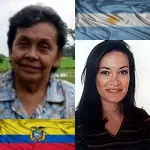Andrea is an English and Spanish teacher and a freelance translator, originally from Argentina but now living in France. Lola is from Ecuador and she is an English-Spanish translator. Both are also volunteer translators with Freelang. Because they share a common field of expertise, we chose to ask Lola and Andrea the same questions.
Interview by Beaumont
Published November 7, 2013
Can you introduce yourself in a few words?
Lola – I am Dolores Gutierrez, called Lola for short. I am a 68 years old mother of a boy and a girl and grandmother of 5 youngsters, 3 of them are 22 years old (a girl and two boys) one girl who is 20 years old and a boy of 15. I work now on freelance full time basis as an English Spanish Translator.
Andrea – My name is Andrea Montiel. I’m from Argentina. I’m an English and Spanish Teacher. Spanish is my mother tongue. I’m in charge of Coach de langues (a translation-teaching network) in the south of France.
How did you become interested in foreign languages, and especially English?
Lola – My father loved English and he taught me the essentials. I have used the language while working at a shipping agency, and after retiring I decided to make my living on basis of the language.
Andrea – I started learning English at the age of 8. I love studying, learning and teaching this language. I’ve never stopped talking English since then.
And how did you achieve to become bilingual? What was your learning method?
Lola – Guess it was due to practice. I even read comics in English! I took English classes and I practiced with my father.
Andrea – Watching lost of films, reading English books is the best way to learn but also studying with ENGLISH books… that’s the clue.
Would you say English is a difficult language to learn for native Spanish speakers?
Lola – I guess learning a second language is difficult, but a good teacher and lots practice do the miracle.
Andrea – English is easy, very easy indeed.
Are there any differences between Spanish spoken in South America and “standard” Spanish of Spain? What are they?
Lola – Yes, there are differences even in the Spanish spoken in Ecuador, not to mention the words used in other Spanish speaking south american countries. Just to mention a few, guagua in the highland part of Ecuador is ‘baby’ while in the coastal region we say niño, while guagua in Cuba is a bus. We say oprimir for ‘press down’ and in Colombia they say espichar. Pajilla (Guatemala), popote (Mexico), sorbete (Ecuador) = ‘drinking straws’. Bonche: ‘street disturbance’ (in Colombia), ‘problem’ (in El Salvador), ‘a great amount of something’ (in México) and ‘party’ (in Venezuela).
Andrea – Just the accent when talking but grammar is the same. Some vocabulary too but it’s not difficult to understand.
Could you tell us if there are particularities in Spanish as it is spoken in your country?
Lola – In Ecuador, people living in the highland region use words from Quechua and they pronounce words stressing the ‘s’ sound, in Cuenca (located also in the highland region) aside from stressing the sound of ‘s’, they have a special intonation that sounds as if they are singing; people from Guayaquil are said to “eat” the ‘s’ sound and talking too fast; people from Esmeraldas speak in a gutural way and they too have words that only they use.
Andrea – In Argentina we speak very fast and some people say we “eat” the end of words but that’s not really true!
How did you become a professional translator?
Lola – While studying I was the girl who spoke english so I was the “official” translator for my classmates. When I started working I was the girl that not only spoke english but that also could translate from and into English. So, when I retired it was natural to make my living from translation.
Andrea – By chance… working as a bilingual assistant.
Are you specialized in some particular fields?
Lola – I mostly enjoy translating commercial, legal, environmental, and technical documents.
Andrea – Tourism, gastronomy, general English demands.
Besides Spanish and English, do you speak another language or are you planning to learn one?
Lola – No, I don´t.
Andrea – I speak French. I’m actually living in France. I ‘d love to learn Japanese.
Andrea, you’re also a teacher. Where do you teach and who are your students?
Andrea – I teach English to kids, teenagers and Adults beginner level. I teach Spanish all level.
Is Spanish an easy language to learn for French people? What are the main hurdles?
Andrea – It’s easier than English at first but then grammar can be difficult if you don’t practice and follow a logical order to learn and improve your level.
Lola, is Spanish a difficult language to learn for English speaking people?
Lola – Yes, I think it is. We have verb conjugation that is different for each person, adjectives have to agree with number and person. We have eight different articles while in english we have ‘the, a, an’.
According to you, why should people learn Spanish in today’s world? What kind of benefits can it bring, compared to, say, French, Russian, Chinese or Hindi?
Lola – Guess Chinese will become more and more important in view of economic power of China.
Andrea – Spanish is the 3rd most spoken language in the world so… it could be really useful for business and tourism.
What would be your advice, especially concerning the method, for anyone wanting to learn Spanish? Is self-teaching with free Internet resources an option?
Lola – No, self-teaching is not the ideal way of learning Spanish; I guess any language is better learned with a formal teacher.
Andrea – Free internet lessons are just helpful but you can’t learn any language if you don’t practice it. Somewhere, somehow you’ll need a good teacher.
You are also both volunteer translators on Freelang. What kinds of requests do you receive, and how do you like this activity?
Lola – I have received requests for translating phrases, instructions for operating machines, expressions to use in birthday cards.
Andrea – I like helping people; I don’t do any commercial free translation, homework either. People ask for help to get in touch with friends, to become a godfather or godmother to someone living in South America, to translate any adoption request, to answer love letters.
Apart from Freelang, do you have other favorite websites you wish to share with our readers? Or any website you wish to promote, including yours, maybe?
Lola – I am a frequent user of Word Reference, My Memory, Glosbe and Linguee. I have no Web Page yet!
Andrea – I’d like to promote Coach de langues as a teaching service and Word Reference, the best dictionary on line.
Thank you very much, Lola and Andrea! 🙂



